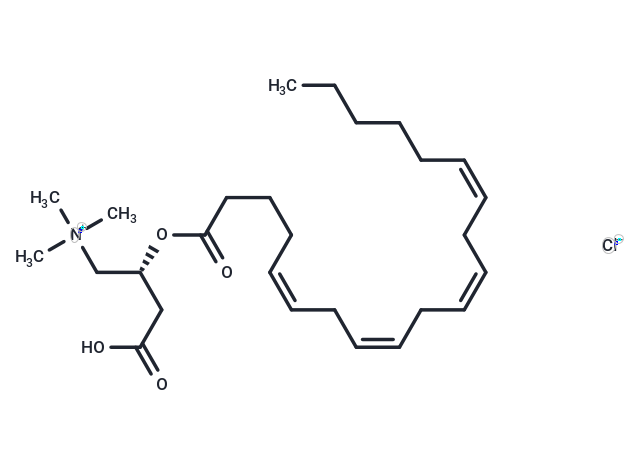购物车
全部删除  您的购物车当前为空
您的购物车当前为空
别名 L-Carnitine arachidonoyl ester chloride, L-Arachidonoylcarnitine chloride, CAR 20:4 chloride, C20:4 Carnitine chloride, Arachidonoyl-L-carnitine 氯化物
Arachidonoyl-L-carnitine chloride是一种内源性代谢物和酰基肉碱,广泛应用于生物化学实验和代谢紊乱研究。

Arachidonoyl-L-carnitine chloride是一种内源性代谢物和酰基肉碱,广泛应用于生物化学实验和代谢紊乱研究。
| 规格 | 价格 | 库存 | 数量 |
|---|---|---|---|
| 10 mg | ¥ 1,580 | 待询 | |
| 25 mg | ¥ 2,798 | 待询 | |
| 50 mg | ¥ 5,180 | 待询 |
| 产品描述 | Arachidonoyl-L-carnitine chloride is an endogenous metabolite and acylcarnitine widely used in biochemical experiments and studies of metabolic disorders. |
| 别名 | L-Carnitine arachidonoyl ester chloride, L-Arachidonoylcarnitine chloride, CAR 20:4 chloride, C20:4 Carnitine chloride, Arachidonoyl-L-carnitine 氯化物 |
| 分子量 | 484.11 |
| 分子式 | C27H46ClNO4 |
| CAS No. | 2133455-98-6 |
| Smiles | [C@H](OC(CCC/C=C\C/C=C\C/C=C\C/C=C\CCCCC)=O)(C[N+](C)(C)C)CC(O)=O.[Cl-] |
| 存储 | store at low temperature | Powder: -20°C for 3 years | In solvent: -80°C for 1 year | Shipping with blue ice/Shipping at ambient temperature. | ||||||||||||||||||||
| 溶解度信息 | Ethanol: 20 mg/mL (41.31 mM), Sonication is recommended. DMF: 15 mg/mL (30.98 mM), Sonication is recommended. DMSO: 5 mg/mL (10.33 mM), Sonication is recommended. PBS (pH 7.2): 5 mg/mL (10.33 mM), Sonication is recommended. | ||||||||||||||||||||
溶液配制表 | |||||||||||||||||||||
DMSO/PBS (pH 7.2)/DMF/Ethanol
| |||||||||||||||||||||
以上为“体内实验配液计算器”的使用方法举例,并不是具体某个化合物的推荐配制方式,请根据您的实验动物和给药方式选择适当的溶解方案。
对于不同动物的给药剂量换算,您也可以参考 更多